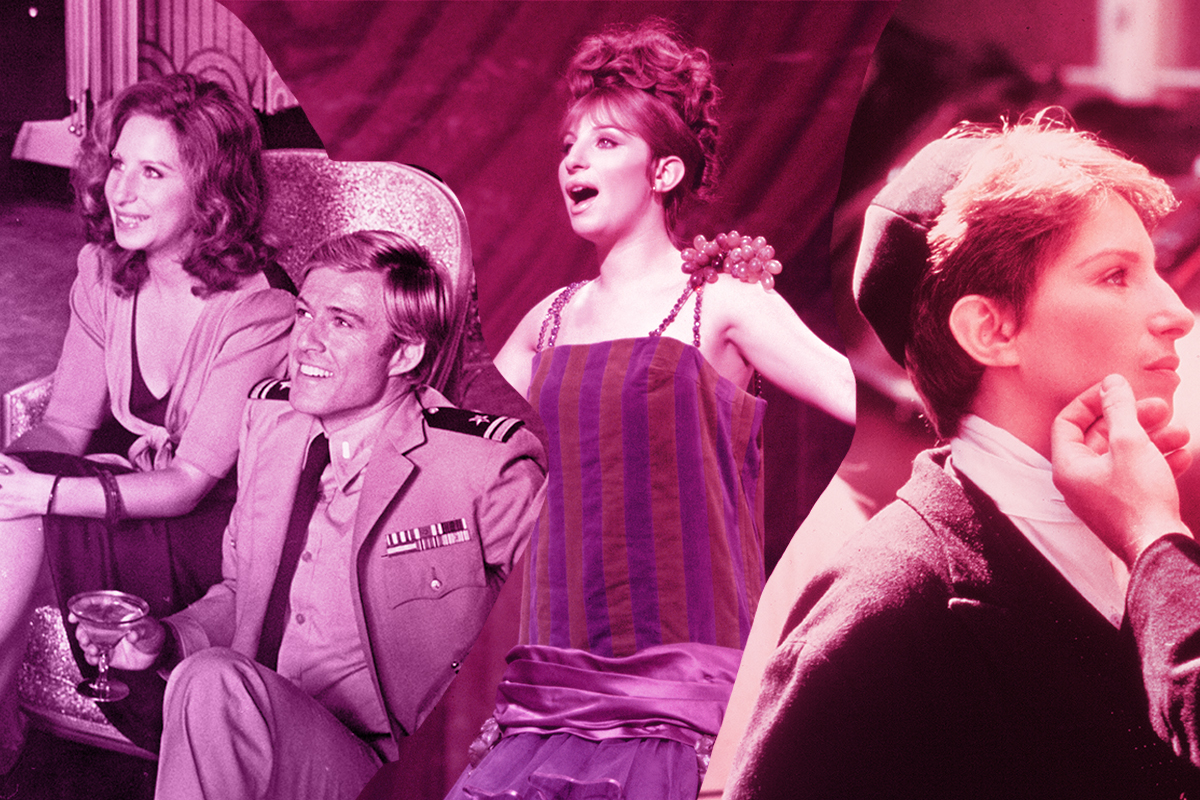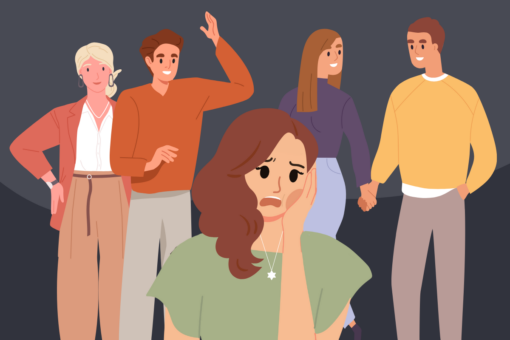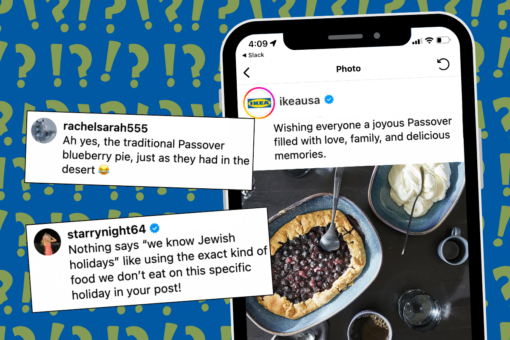As a Jew with an encyclopedic knowledge of musical theater, it is ridiculous that I had not seen a single Barbra Streisand movie until this year. Even more absurd is that somehow, in their absence, I’ve become someone who seems like she modeled her personality off of them. On a good day, I’m low-energy Mrs. Maisel with worse clothes and a working proficiency in Google Suite. On a bad day, I’m a slightly less toxic Rachel Berry from Glee.
Even without exposure to her work, I’ve always felt a strange kinship to Barbra Streisand. I’d listen to “Miss Marmelstein” on the Broadway radio station and feel like I could find myself in her Brooklyn accent as she babbled verbal ad libs. I could spot her iconic profile from miles away. I even absorbed secondhand fandom from the aforementioned Rachel Berry. Icons, especially ones who represent you, are hard to ignore. Barbra Streisand swirled around the edges of my cultural consciousness until I actively began to miss the space she could have occupied.
So, during the Just Finished The Six Season TV Series phase of my quarantine, I finally decided to watch her films. After emerging from my first of probably many deep dives into her filmography, here are my thoughts.
Barbra Can You Hear Me?
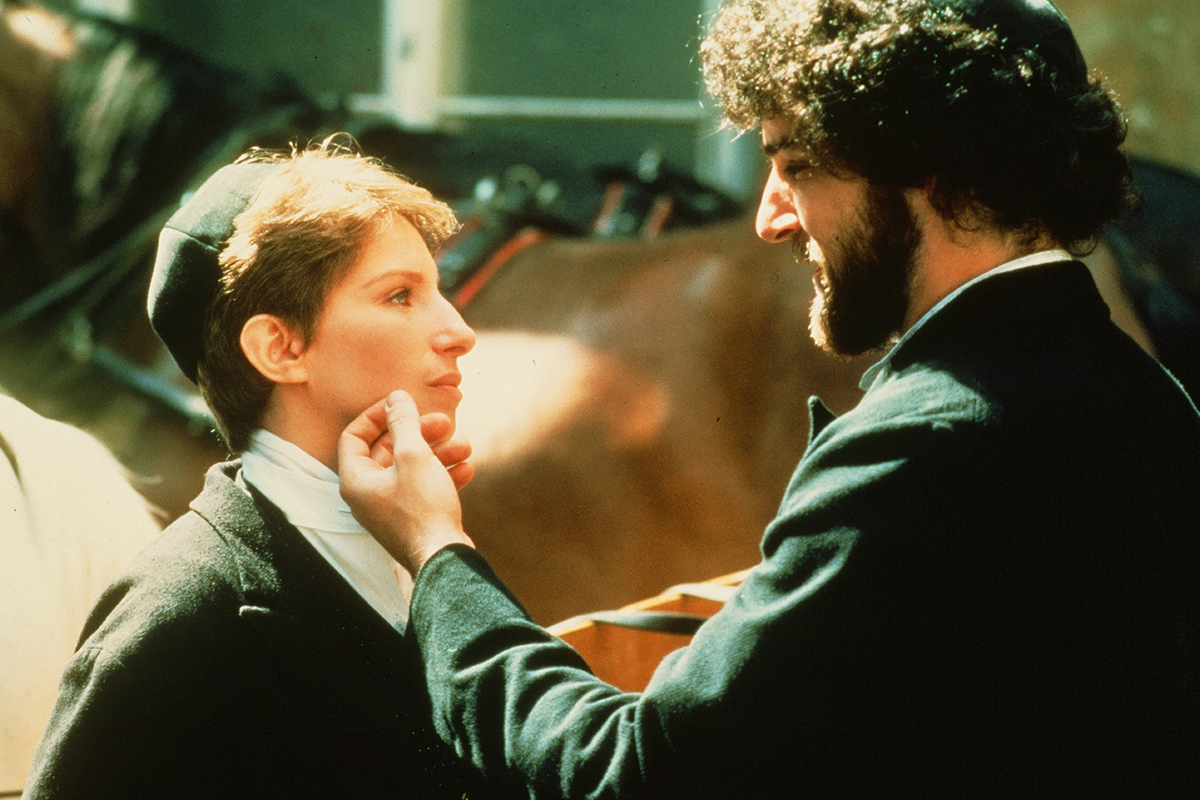
We began with Yentl, a 1983 film which I can only describe as shtetl yeshiva Twelfth Night. And not only did Barbra “Auteur” Streisand star in this film — she adapted, directed, and produced it. Yentl embodies the unabashed wackiness I wish more art embraced. Milking Yentl’s bumbling awkwardness while being measured by a swarm of pushy tailors or scrounging for alternatives to sex with a woman (drunk pillow fight, study Talmud, etc.), Barbra is almost winking at us. Then, she sings a sweeping power ballad so profoundly, heart-meltingly earnest that we forget the campy ridiculousness and embrace the melodrama at face value. Plus, the very tenuous dramaturgy of Yentl mostly lip syncing when she’s alone while treating the song as inner monologue when she’s with other people shocks me and shatters my understanding of musical theater. Are we supposed to believe that she actually sings to forest-void in the iconic ’80s music video that is “Papa Can You Hear Me?” Nevertheless, I am a sucker for close-up shots of tears streaming down a diva’s face that fades into a landscape, so had no choice but to emotionally invest 110%.
Barbra has The Music That Makes Her Dance. I have The Movies That Make Me Shriek. Yentl is one of those movies. While watching, every emotion rattled in the core of my being: the liberation, the distress, the yearning. If you haven’t seen Yentl, what are you doing? Finish this article, watch the movie, and text me all of your thoughts. I was also NOT warned that young, hot Mandy Patinkin would be not only present but present as a sex-crazed, sometimes misogynistic, and always intellectual fellow yeshiva student. So here I am, warning you. Beyond missing that hummingbird vibrato of his, I have no notes.
The takeaway: If you board a boat to America in 1905 and belt high enough, the sound barrier will give way to Second Wave Feminism.
Mem’ries
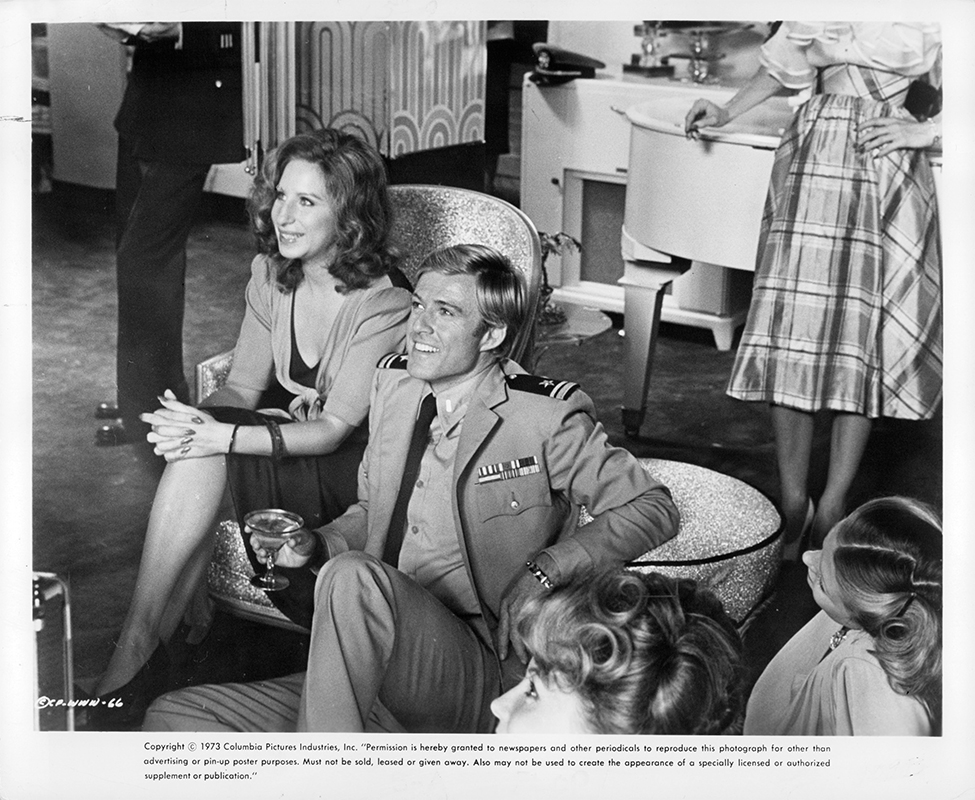
When going through the list of Barbra Streisand movies with my parents, each time I got to The Way We Were, they howl-sang the word “memories.” Each time, I said, “No. That’s from Cats.” I was wrong. It is the hook of the hit single title song of The Way We Were, a romantic comedy set in — and I cannot stress this enough — McCarthyism-era Hollywood starring Barbra as socialist Katie Morosky, opposite Robert Redford as all-American soldier-turned-screenwriter Hubbell Gardiner. Some might say it’s the best love story Arthur Laurents cooked up since West Side Story. Others might say it’s the bipartisan break-up narrative we never asked for. Allegedly, it was inspired by Laurents’ college days at Cornell and his run-ins with the House Un-American Activities Committee. Go Big Red (in more ways than one)!
After a long day of work, an exasperated Katie goes to a bar and finds a very blond man in a fancy army uniform with the unique ability to sleep completely upright. She looks at his sleepy face and says “Hubbell Gardiner” so wistfully it launches us into a flashback to college, when she was a socialist with a bad perm and he was exactly the same. Watching this scene, it dawns on me that the movie is called The Way We Were because they have a shared past, and I say this out loud. My mom looks at me, stunned by my idiocy. This movie is like all other romantic comedies because when Barbra Streisand puts on lipstick, we forget that she’s loud and Jewish, yet it is also unlike other romantic comedies because it’s very fixated on engaging with specific, nuanced socio-political commentary. Basically, this is a movie about Barbra Streisand calling people fascists and loving FDR, regardless of whether her hair is straight or curly.
The takeaway: When your husband can get over the fact that you’re not conventionally attractive but just can’t shake your leftist politics, leave Hollywood. You’re better off without him.
A Bagel on a Plate Full of Onion Rolls
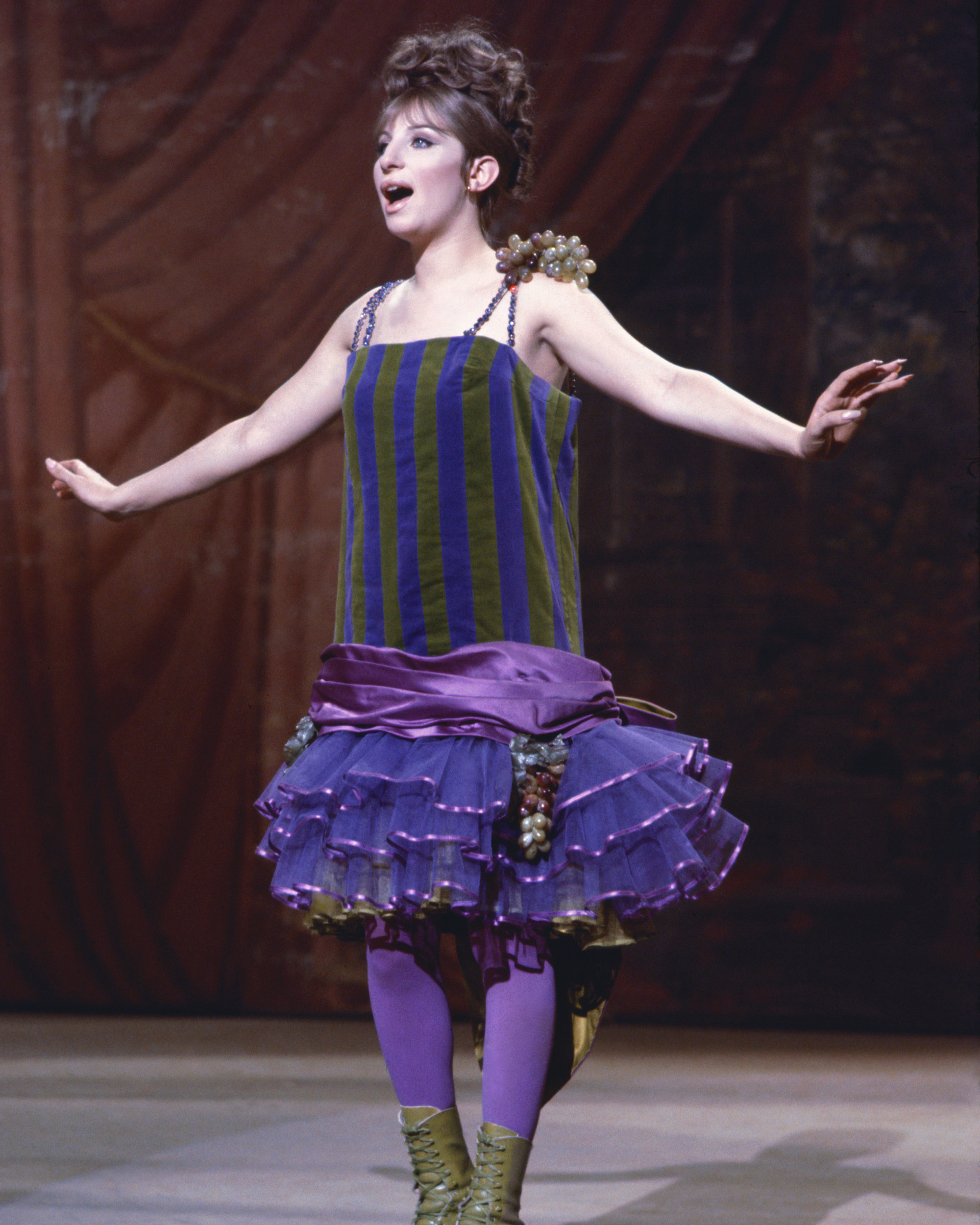
Back in the late Facebook messenger stage of our relationship, my friend and I saw a niche piece of experimental theater that featured one character hyping herself up to confront an ex after a plane ride while another sang “I’m the Greatest Star.” Somewhere in our post-show debrief, she learned that I had never seen Funny Girl. After some deserved scolding, I promised her that she would be there the first time I watched it. A year and a half later, I, a mediocre friend, shared my Zoom screen with her as we finally watched Funny Girl.
In many ways, Funny Girl is quintessential Streisand. Toggling between Fanny Brice’s broadly goofy vaudeville persona and hardened, heartbroken diva all the while belting her face off is how our girl initially rose to megastardom. Yet between the slapstick and the songs and the dresses, Fanny Brice’s palpable self-consciousness saddened me because of how deeply it hit home. Fanny is told, implicitly and explicitly, that the way she looks means she’s undeserving of love. She’s told this enough times to have absorbed it completely.
While Fanny Brice’s pregnant bride number is hilarious, I recognized the ways in which she used humor as armor — I’ve learned to do the same thing. I was always one of the tallest kids in plays I would do in middle school, so I started getting cast as mothers and villains. I felt safe building giant characters up around myself, engineered to make other people laugh. While theater has been a huge source of joy for me, I’m still carrying around the strange baggage of being told that I read as 45 when I was 16. Fictionalized Fanny Brice denounces yet never fully casts away that baggage in Funny Girl. As the space between Fanny and Barbra (which was never very wide in the first place) collapsed, I felt like she was holding up a mirror to my own insecurities. The implications of ending the movie with “My Man” (and also everything that Nicky Arnstein does) left a sour taste in my 2020 feminist mouth. Still, Funny Girl made me feel strangely empowered to both embrace and stop agonizing about my strained relationship to my body.
The takeaway: If societal beauty standards are powerful enough to get even Barbra Streisand down, let this be my personal call to declare them dissolved.
In each of these movies, Barbra Streisand grapples with what it means to believe you’re gorgeous or smart or worthy in a world that tells you otherwise. Would an earlier encounter with my new favorite Jewish Diva-in-Residence have saved me from crises of confidence? Perhaps not. But I’m glad that we’re acquainted now.
Header image design by Emily Burack. L-R: “The Way We Were” via Columbia Pictures/Getty Images, “Funny Girl” via Silver Screen Collection/Getty Images, and “Yentl” via Hulton Archive/Getty Images.
